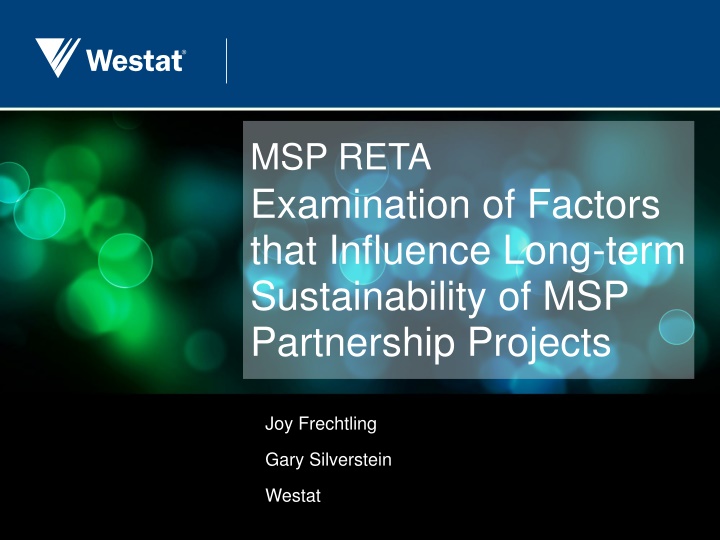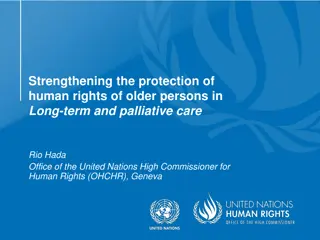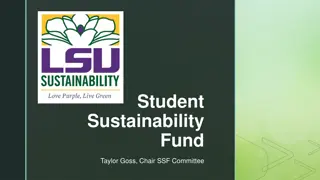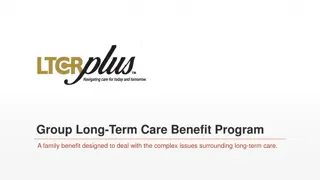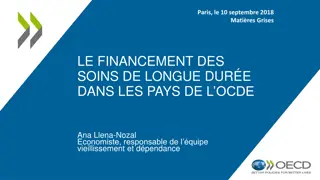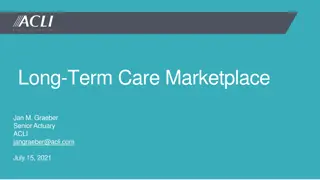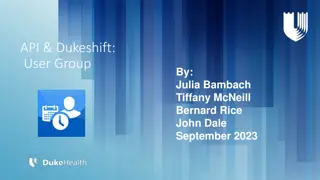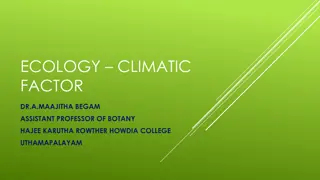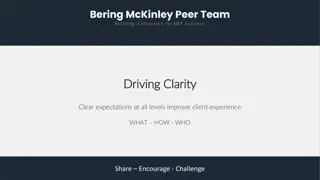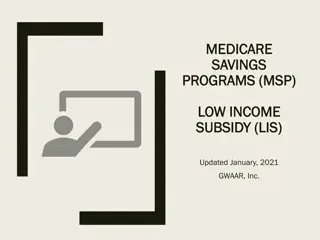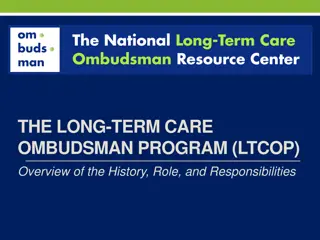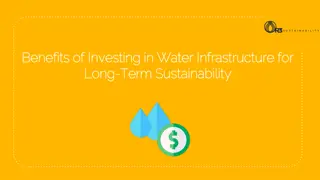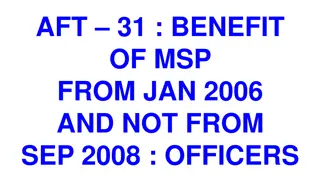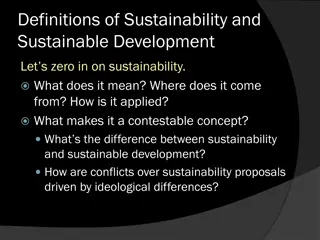Factors Influencing MSP Projects' Long-term Sustainability
This research project examines the strategies and mediators influencing the long-term sustainability of MSP partnership projects, focusing on cohorts funded between 2002 and 2004. Through document reviews, interviews, and case studies, the study aims to develop a conceptual framework, document sustainability strategies, and enhance understanding of supporting STEM education. Challenges include defining sustainability, participant cooperation, and data analysis amidst various variables.
Download Presentation

Please find below an Image/Link to download the presentation.
The content on the website is provided AS IS for your information and personal use only. It may not be sold, licensed, or shared on other websites without obtaining consent from the author.If you encounter any issues during the download, it is possible that the publisher has removed the file from their server.
You are allowed to download the files provided on this website for personal or commercial use, subject to the condition that they are used lawfully. All files are the property of their respective owners.
The content on the website is provided AS IS for your information and personal use only. It may not be sold, licensed, or shared on other websites without obtaining consent from the author.
E N D
Presentation Transcript
MSP RETA Examination of Factors that Influence Long-term Sustainability of MSP Partnership Projects Joy Frechtling Gary Silverstein Westat
Research Questions (1) What strategies did the initial cohort of MSPs use to sustain and nurture their outcomes beyond their NSF award? (2) What were the mediators that either facilitated or hindered project efforts to sustain these outcomes?
Overview of Research Plan Three year study Focus on the first two cohorts; MSPs funded between 2002 and 2004 Two phases Document review, interviews with current and former program officers, PI interviews Case studies of selected projects (10)
Expected Benefits for the Field Develop a conceptual framework grounded in the existing literature in education and related fields on sustainability. Document the strategies MSPs used to sustain and expand the successful outcomes of their initial project efforts. Provide a rich and expansive examination of the mediators that can facilitate or hinder efforts to sustain complex educational initiatives. Enhance the field s understanding of how to support and sustain K-20 STEM learning in a variety of settings.
Advisory Board Jeanne Century Director of Science Education, Research & Evaluation, University of Chicago's Center for Elementary Mathematics and Science Education Andrew Chen President, EduTron Corporation Cynthia E. Coburn Visiting Professor at the School of Education and Social Policy, Northwestern University Emorcia Hill Program Director. Converge: Building Inclusion in the Sciences through Research, Harvard Medical School Susan B. Millar Senior Scientist Retired, Wisconsin Center for Education Research Jennifer Russell Assistant Professor, University of Pittsburgh School of Education; Research Scientist, Learning Research & Development Center Wayne Welch Professor Emeritus of Educational Psychology, University of Minnesota
Challenges Conceptual/theoretical Defining sustainability Practical Getting PI to agree to participate Identifying appropriate predictors to examine Identifying a sample for the case study Making sense of the data amid a range of potentially confounding variables Getting project buy-in to the case study Identifying respondents and getting their cooperation
Defining Sustainability Literature on studies of sustainability frequently do NOT operationally define the what of what is being studied Studies are rarely explicit about their criteria for defining sustainability Debates frequently consider fidelity vs. adaptation Discussions address core principles, but guidance in defining core principles is limited. Other debates relate to breadth of continuation-does there need to be a critical mass of X ?
Definitions of Sustainability A change may be considered sustained when it continues past the point of consensually recognized sound implementation to become a regular part of school practices (Elias, 2010). In practical, school-level terms, sustainability is the creation of a social norm, the point at which a practice ceases to be a project or initiative and becomes institutionalized (McIntosh et al., N.D.). Sustainability should not be defined simply as program continuation, but as the continued implementation of an intervention or prevention program, with ongoing implementation fidelity to core program principles (DeRousie & Bierman, 2012; Han & Weiss, 2005, p. 666).
The What in Our Research Looking at outcomes for Organizations Individuals (faculty, admin) Considering continue positive impacts on student learning and achievement Looking at outcomes for both IHE and K-12 partners
Suggested Outcome Dimensions An MSP project effort is sustained in the case where one or more of the following components of project effort, in whole or in part, is retained or continued in practice after initial NSFMSP grant has ceased: Level Component Organization structures/systems/policies Relationships and Partnerships (formal) Organizational Faculty Supports/Professional Development Instructional Approaches and Practices Materials/Curricula/Courses
Suggested Outcome Dimensions (cont.) Level Component Relationships and Partnerships (informal) Instructional Approaches and Practices Individual Roles and Responsibilities Skills and Knowledge 11
Suggested Outcome Dimensions (cont.) Level Component Knowledge Attitudes Student Engagement Skills Career Interests
Mediators of Sustainability Approach has special focus on studying sustainability taking into account a set of mediators Mediators are variables at both the project and broader contextual levels that are hypothesized to have a significant influence on outcomes (practices and their results) Identification of mediators based on review of literature in the education and related fields
Examples of Mediators Commitment at all levels of leadership Perceived mutual benefits Availability of new funding Relationships of trust Alignment/coherence of improvement efforts Personal characteristics of actors Organizational/structural changes
Theory of Change Puts mediators into a special position in the logic model we are using to scaffold the work Conceptualizes mediators as having an effect over time Conceptualizes mediators as also changing over time
Theory of Change Strategies for Sustainability Short Term Outcomes Mid and Long Term Outcomes Inputs Mediators Commitment at all levels of leadership Continued allocation of resources to activities Recommitment to shared goals Institutional and Individual changes resulting from initial grant Continued and broadened value and support for the project s structures, relationships, collaborations, policies, and practices Perceived mutual benefits Continuation and expansion of institutional and individual benefits resulting from initial grant Continued development and negotiation of roles in context Student outcomes in the educational, motivational and attitudinal areas Availability of new funding Development of products, tools, and strategies to support partnership work Continued and broadened ownership for project goals and activities Relationships of trust Sources of ongoing financial support Alignment/ coherence of improvement efforts Negotiation of coherence between partnership goals and other organizational goals Spread of changes more broadly across partners Personal characteristics of actors Continuation and expansion of MSP related student outcomes External/ community factors
Inputs Theory of Change Strategies for Sustainability Short Term Outcomes Institutional and Individual changes resulting from initial grant Mid and Long Term Outcomes Inputs Mediators Commitment at all levels of leadership Continued allocation of resources to activities Recommitment to shared goals Institutional and Individual changes resulting from initial grant Continued and broadened value and support for the project s structures, relationships, collaborations, policies, and practices Perceived mutual benefits Continuation and expansion of institutional and individual benefits resulting from initial grant Continued development and negotiation of roles in context Student outcomes in the educational, motivational and attitudinal areas Availability of new funding Student outcomes in the educational, motivational and attitudinal areas Development of products, tools, and strategies to support partnership work Continued and broadened ownership for project goals and activities Relationships of trust Sources of ongoing financial support Alignment/ coherence of improvement efforts Negotiation of coherence between partnership goals and other organizational goals Spread of changes more broadly across partners Personal characteristics of actors Sources of ongoing financial support Continuation and expansion of MSP related student outcomes External/ community factors
Strategies for Sustainability Short Term Outcomes Mid and Long Term Outcomes Inputs Mediators Theory of Change Commitment at all levels of leadership resources to activities Continued allocation of Recommitment to shared goals Institutional and Individual changes resulting from initial grant Strategies for Sustainability Short Term Outcomes Mid and Long Term Outcomes Inputs Mediators Continued and broadened value and support for the project s structures, relationships, collaborations, policies, and practices Perceived mutual benefits Commitment at all levels of leadership Continued allocation of resources to activities Continuation and expansion of institutional and individual benefits resulting from initial grant Recommitment to shared goals Institutional and Individual changes resulting from initial grant Continued development and negotiation of roles in context Continued and broadened value and support for the project s structures, relationships, collaborations, policies, and practices Student outcomes in the educational, motivational and attitudinal areas Perceived mutual benefits Continuation and expansion of institutional and individual benefits resulting from initial grant Continued and broadened ownership for project goals and activities Availability of new funding Continued development and negotiation of roles in context Development of products, tools, and strategies to support partnership work Student outcomes in the educational, motivational and attitudinal areas Availability of new funding Relationships of trust Development of products, tools, and strategies to support partnership work Continued and broadened ownership for project goals and activities Relationships of trust Sources of ongoing financial support Alignment/ coherence of improvement efforts Sources of ongoing financial support Alignment/ coherence of improvement efforts Negotiation of coherence between partnership goals and other Negotiation of coherence between partnership goals and other organizational goals organizational goals Spread of changes more broadly across partners Spread of changes more broadly across partners Personal characteristics of actors characteristics of actors Personal Continuation and expansion of MSP related student outcomes Continuation and expansion of MSP related student outcomes External/ community factors External/ community factors
Strategies for Sustainability Short Term Outcomes Mid and Long Term Outcomes Inputs Mediators Theory of Change Commitment at all levels of leadership resources to activities Continued allocation of Recommitment to shared goals Institutional and Individual changes resulting from initial grant Strategies for Sustainability Short Term Outcomes Mid and Long Term Outcomes Inputs Mediators Commitment at all levels of leadership Continued allocation of resources to activities Continued development and negotiation of roles in context Recommitment to shared goals Institutional and Individual changes resulting from initial grant Continued and broadened value and support for the project s structures, relationships, collaborations, policies, and practices Perceived mutual benefits Continuation and expansion of institutional and individual benefits resulting from initial grant Continued and broadened value and support for the project s structures, relationships, collaborations, policies, and practices Perceived mutual benefits Continuation and expansion of institutional and individual benefits resulting from initial grant Continued development and negotiation of roles in context Student outcomes in the educational, motivational and attitudinal areas Availability of new funding Student outcomes in the educational, motivational and attitudinal areas Availability of new funding Development of products, tools, and strategies to support partnership work and strategies to support partnership work Development of products, tools, Continued and broadened ownership for project goals and activities Relationships of trust Continued and broadened ownership for project goals and activities Relationships of trust Sources of ongoing financial support Alignment/ coherence of improvement efforts Negotiation of coherence between partnership goals and other organizational goals coherence between partnership goals and other organizational goals Spread of changes more broadly across partners Sources of ongoing financial support Alignment/ coherence of improvement efforts Personal characteristics of actors Negotiation of Spread of changes Continuation and expansion of MSP related student outcomes more broadly across partners External/ community factors Personal characteristics of actors Continuation and expansion of MSP related student outcomes External/ community factors
Strategies for Sustainability Short Term Outcomes Mid and Long Term Outcomes Inputs Mediators Theory of Change Continued allocation of resources to activities Commitment at all levels of leadership Strategies for Sustainability Short Term Outcomes Mid and Long Term Outcomes Recommitment to shared goals Institutional and Individual changes resulting from initial grant Inputs Mediators Commitment at all levels of leadership Continued allocation of resources to activities Recommitment to shared goals Institutional and Individual changes resulting from initial grant Continued and broadened value and support for the project s structures, relationships, Perceived mutual benefits Continuation and expansion of institutional and individual benefits Continued and broadened value and support for the project s structures, relationships, collaborations, policies, and practices collaborations, policies, and practices Perceived mutual benefits Continued development and negotiation of roles in context Continuation and expansion of institutional and individual benefits resulting from initial grant resulting from initial grant Continued development and negotiation of roles in context Student outcomes in the educational, motivational and attitudinal areas Student outcomes in the educational, motivational and attitudinal areas Availability of new funding Availability of new funding Development of products, tools, and strategies to support partnership work Continued and broadened ownership for project goals and activities Continued and broadened ownership for project goals and activities Relationships of trust Development of products, tools, and strategies to support partnership work Sources of ongoing financial support Alignment/ coherence of improvement efforts Relationships of trust Negotiation of coherence between partnership goals and other organizational goals Spread of changes more broadly across partners Personal characteristics of actors Negotiation of coherence between partnership goals and other organizational goals Sources of ongoing financial support Alignment/ coherence of improvement efforts Continuation and expansion of MSP related student outcomes Spread of changes more broadly across partners External/ community factors Personal characteristics of actors Continuation and expansion of MSP related student outcomes External/ community factors
Strategies for Sustainability Short Term Outcomes Mid and Long Term Outcomes Inputs Mediators Theory of Change Strategies for Sustainability Recommitment to shared goals Short Term Outcomes Commitment at all levels of leadership Mid and Long Term Outcomes Continued allocation of resources to activities Inputs Mediators Institutional and Individual changes resulting from initial grant Commitment at all levels of leadership Continued allocation of resources to activities Recommitment to shared goals Institutional and Individual changes resulting from initial grant Continued and broadened value and support for the project s structures, relationships, collaborations, policies, and practices Perceived mutual benefits Continued and broadened value Continuation and expansion of institutional and individual benefits resulting from initial grant institutional and individual benefits resulting from initial grant Perceived mutual benefits Continued development and negotiation of roles in context and support for the project s structures, relationships, collaborations, policies, and practices Continuation and expansion of Continued development and Student outcomes in the educational, motivational and attitudinal areas negotiation of roles in context Availability of new funding Development of products, tools, and strategies to support partnership work Student outcomes in the educational, motivational and attitudinal areas Continued and broadened ownership for project goals and activities Relationships of trust Availability of new funding Sources of ongoing financial support Development of products, tools, and strategies to support partnership work Alignment/ coherence of improvement efforts Negotiation of coherence between partnership goals and other organizational goals broadened ownership for project goals and activities Spread of changes more broadly across partners Personal characteristics of actors Continued and Relationships of trust Continuation and expansion of MSP related student outcomes External/ community factors Sources of ongoing financial support Alignment/ coherence of improvement efforts Negotiation of coherence between partnership goals and other organizational goals Spread of changes more broadly across partners Personal characteristics of actors Continuation and expansion of MSP related student outcomes External/ community factors
Strategies for Sustainability Short Term Outcomes Mid and Long Term Outcomes Inputs Mediators Theory of Change Commitment at all levels of leadership resources to activities Continued allocation of Recommitment to shared goals Institutional and Individual changes resulting from initial grant Strategies for Sustainability Short Term Outcomes Mid and Long Term Outcomes Inputs Mediators Continued and Commitment at all levels of leadership Continued allocation of resources to activities development and negotiation of roles in context Perceived mutual benefits Recommitment to shared goals broadened value and support for the project s structures, relationships, collaborations, policies, and practices Institutional and Individual changes resulting from initial grant Continuation and expansion of institutional and individual benefits resulting from initial grant Continued Continued and broadened value and support for the project s structures, relationships, collaborations, policies, and practices Continued and broadened ownership for project goals and activities Perceived mutual benefits Student outcomes in the educational, motivational and attitudinal areas Continuation and expansion of institutional and individual benefits resulting from initial grant Availability of new funding Continued development and negotiation of roles in context Development of products, tools, and strategies to support partnership work Student outcomes in the educational, motivational and attitudinal areas Availability of new funding Relationships of trust Development of products, tools, and strategies to support partnership work Continued and broadened ownership for project goals and activities Relationships of trust Sources of ongoing financial support Alignment/ coherence of improvement efforts Sources of ongoing financial support Alignment/ coherence of improvement efforts Negotiation of coherence between partnership goals and other organizational goals and other organizational goals Negotiation of coherence between partnership goals Spread of changes more broadly across partners more broadly across partners Spread of changes Personal characteristics of actors Personal characteristics of actors Continuation and expansion of MSP related student outcomes External/ community factors Continuation and expansion of MSP related student outcomes External/ community factors
Questions 23
